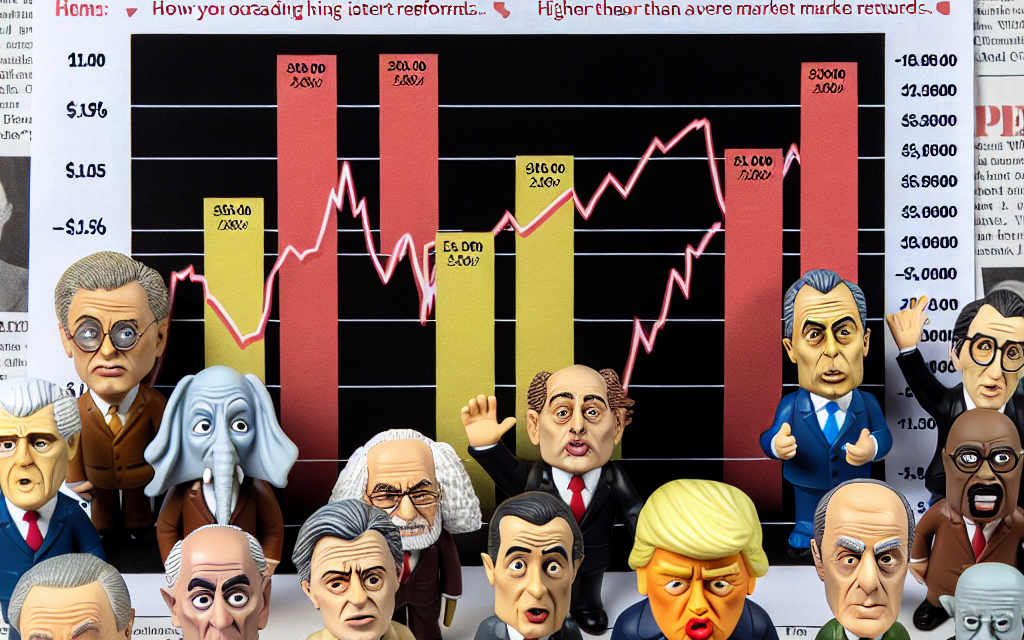“Congress Members: Consistently Outpacing the Stock Market – A New Report Unveils the Trend!”
Introduction
A recent report highlights a striking trend: members of Congress have consistently outperformed the stock market in their investment returns. This phenomenon raises questions about the financial acumen of lawmakers and the potential implications of their trading activities. The analysis reveals that, despite the volatility of the market, congressional portfolios have shown resilience and growth, suggesting that these individuals may possess unique insights or advantages in navigating financial markets. As scrutiny over the ethical dimensions of congressional trading intensifies, this report sheds light on the intersection of politics and finance, prompting a reevaluation of the rules governing lawmakers’ investment practices.
Congress Members’ Investment Strategies: A Closer Look
In recent years, the investment strategies of Congress members have garnered significant attention, particularly in light of their consistent outperformance of the stock market. A report highlighting these trends reveals that many lawmakers have developed unique approaches to investing, which not only reflect their personal financial acumen but also raise questions about the implications of their financial activities on public trust and governance. As we delve deeper into the investment strategies employed by these members of Congress, it becomes evident that their decisions are often influenced by a combination of insider knowledge, market timing, and a keen understanding of economic indicators.
One of the most striking aspects of Congress members’ investment strategies is their ability to capitalize on market trends before they become widely recognized. This phenomenon can be attributed, in part, to their access to privileged information that is not readily available to the general public. For instance, lawmakers often participate in discussions and receive briefings on upcoming legislation that could significantly impact specific industries. Consequently, they may choose to invest in stocks or sectors poised for growth based on this insider knowledge. While such practices are legal, they raise ethical concerns regarding the potential for conflicts of interest and the integrity of the legislative process.
Moreover, the timing of their investments plays a crucial role in their financial success. Many Congress members have demonstrated a remarkable ability to enter and exit positions at opportune moments, thereby maximizing their returns. This skill is not merely a product of luck; rather, it reflects a sophisticated understanding of market dynamics and economic cycles. By closely monitoring economic indicators, such as unemployment rates, inflation, and consumer confidence, these lawmakers can make informed decisions that align with broader market movements. This strategic foresight often results in substantial gains, further distinguishing their performance from that of average investors.
In addition to their market-savvy approaches, Congress members frequently diversify their portfolios to mitigate risk and enhance returns. This diversification often includes investments in various asset classes, such as real estate, commodities, and international markets. By spreading their investments across different sectors, they can protect themselves against market volatility and capitalize on emerging opportunities. This strategy not only reflects a prudent financial approach but also underscores the importance of adaptability in an ever-changing economic landscape.
Furthermore, the investment behaviors of Congress members can also be influenced by their personal beliefs and values. Many lawmakers are known to invest in companies that align with their political ideologies or support causes they champion. For example, a member of Congress advocating for renewable energy may choose to invest in green technology firms, thereby aligning their financial interests with their legislative priorities. This alignment can create a sense of authenticity and commitment to their constituents, although it also raises questions about the potential for self-serving motivations.
As we analyze the investment strategies of Congress members, it becomes clear that their financial decisions are shaped by a complex interplay of knowledge, timing, diversification, and personal values. While their ability to outperform the stock market is impressive, it also highlights the need for transparency and accountability in their financial dealings. As public scrutiny of these practices continues to grow, it is essential for lawmakers to navigate the fine line between personal financial success and their responsibilities as elected officials. Ultimately, the ongoing examination of Congress members’ investment strategies serves as a reminder of the intricate relationship between politics and finance, and the importance of maintaining public trust in the democratic process.
Analyzing the Stock Market vs. Congressional Performance
Recent analyses have revealed a striking trend: members of Congress have consistently outperformed the stock market in terms of investment returns. This phenomenon raises important questions about the relationship between political power and financial acumen, as well as the implications for public trust in elected officials. By examining the performance of congressional investments compared to broader market indices, one can gain insight into the dynamics at play.
To begin with, it is essential to understand the context in which these comparisons are made. The stock market, often represented by indices such as the S&P 500, serves as a barometer for the overall health of the economy. Investors typically look to these indices to gauge market performance and make informed decisions. However, the investment strategies employed by members of Congress appear to diverge significantly from those of the average investor. Reports indicate that congressional portfolios have yielded returns that consistently exceed those of the stock market, suggesting a level of financial insight that is not commonly found among the general populace.
One possible explanation for this disparity lies in the unique access that members of Congress have to information. Elected officials are privy to a wealth of data and insights that the average investor does not possess. This access can lead to informed investment decisions that capitalize on emerging trends or shifts in policy. For instance, when legislation is introduced that could impact specific industries, members of Congress may be able to anticipate market movements and adjust their portfolios accordingly. This advantage raises ethical questions about the potential for insider trading and the need for stringent regulations to ensure transparency and accountability.
Moreover, the investment behavior of Congress members often reflects a strategic approach that contrasts with the more reactive nature of typical investors. While many individuals may buy and sell stocks based on market fluctuations or emotional responses, congressional members tend to adopt a long-term perspective. This approach allows them to weather short-term volatility and focus on the underlying fundamentals of their investments. Consequently, their ability to remain composed during market downturns may contribute to their superior performance.
In addition to these factors, the political landscape itself plays a significant role in shaping investment outcomes. Members of Congress often align their investments with their political ideologies and the interests of their constituents. This alignment can lead to investments in sectors that are poised for growth due to favorable legislation or government support. As a result, congressional portfolios may be more strategically positioned to benefit from economic trends than those of average investors, who may lack the same level of insight into policy implications.
As the data continues to emerge, it becomes increasingly clear that the performance of congressional investments warrants further scrutiny. The implications of this trend extend beyond mere financial returns; they touch upon issues of ethics, governance, and public trust. If members of Congress are indeed leveraging their positions for financial gain, it raises critical questions about the integrity of the political system and the potential for conflicts of interest.
In conclusion, the ongoing analysis of stock market performance versus congressional investment returns reveals a complex interplay of factors that contribute to the latter’s success. While access to information and strategic decision-making play pivotal roles, the ethical considerations surrounding these advantages cannot be overlooked. As the public becomes more aware of these dynamics, it is imperative for lawmakers to uphold transparency and accountability in their financial dealings, ensuring that the trust placed in them by constituents is not compromised.
Key Factors Behind Congress Members’ Financial Success
Recent analyses have revealed a striking trend: members of Congress consistently outperform the stock market in terms of financial returns. This phenomenon raises important questions about the underlying factors contributing to the financial success of these public officials. Several key elements appear to play a significant role in this disparity, shedding light on the unique advantages that Congress members may possess in navigating the complex world of investments.
One of the primary factors contributing to the financial success of Congress members is their access to privileged information. While insider trading is illegal, the nature of their positions often grants them insights into upcoming legislation, regulatory changes, and economic policies that can significantly impact specific industries. This access allows them to make informed investment decisions that the average investor may not be privy to, thereby enhancing their potential for higher returns. Furthermore, the ability to anticipate market movements based on legislative agendas can provide Congress members with a distinct edge over traditional investors.
In addition to access to information, the network of connections that Congress members cultivate can also be a crucial factor in their financial success. The relationships they build with lobbyists, industry leaders, and other influential figures can provide valuable insights into market trends and investment opportunities. These connections often lead to exclusive investment opportunities that are not available to the general public, further amplifying their financial gains. The social capital that comes with their positions enables them to tap into resources and information that can significantly enhance their investment strategies.
Moreover, the financial literacy and investment acumen of Congress members cannot be overlooked. Many individuals who pursue a career in politics possess a background in finance, law, or business, equipping them with the skills necessary to navigate the complexities of the stock market. This expertise allows them to make strategic investment choices that align with their financial goals. Additionally, the experience gained from managing campaign funds and navigating the financial aspects of political campaigns can further enhance their understanding of investment strategies.
Another contributing factor is the relatively stable financial environment that Congress members enjoy. With their salaries and benefits, they often have a financial cushion that allows them to take calculated risks in their investments. This stability can lead to a more aggressive investment approach, as they are less likely to be deterred by short-term market fluctuations. In contrast, average investors may be more risk-averse due to financial constraints, which can limit their potential for higher returns.
Furthermore, the culture of investment within Congress itself may play a role in shaping the financial behaviors of its members. With many colleagues engaging in active trading and investment, there may be a social expectation to participate in the market. This environment can foster a sense of competition and motivation to outperform peers, driving members to seek out lucrative investment opportunities.
In conclusion, the financial success of Congress members compared to the stock market can be attributed to a combination of factors, including access to privileged information, valuable networking opportunities, financial literacy, and a stable financial environment. These elements create a unique landscape in which Congress members can thrive as investors, ultimately leading to their impressive performance in the financial arena. As this trend continues to unfold, it raises important ethical considerations regarding the intersection of politics and personal finance, prompting ongoing discussions about transparency and accountability in the realm of public service.
The Impact of Legislative Decisions on Personal Investments
Recent analyses have revealed a striking trend: members of Congress consistently outperform the stock market in their personal investments. This phenomenon raises important questions about the intersection of legislative decisions and personal financial gain. As lawmakers craft policies that can significantly influence market dynamics, the implications of their investment strategies warrant careful examination.
To begin with, it is essential to understand the unique position that Congress members occupy. They have access to a wealth of information that the average investor does not. This privileged insight can stem from committee meetings, briefings, and discussions that precede public announcements. Consequently, legislators may be able to anticipate market movements based on impending legislation or regulatory changes. Such foresight can lead to strategic investment decisions that yield substantial returns, thereby creating a disparity between their financial performance and that of the general public.
Moreover, the legislative environment is inherently intertwined with economic conditions. Decisions made on Capitol Hill can directly impact various sectors, from healthcare to technology, and these changes can ripple through the stock market. For instance, when Congress debates a new healthcare policy, the stock prices of pharmaceutical companies may fluctuate based on the anticipated outcomes. Members of Congress, who are privy to the nuances of these discussions, may capitalize on this knowledge by adjusting their investment portfolios accordingly. This ability to navigate the complexities of legislative impacts on the market can result in significant financial advantages.
In addition to the advantages of information access, the ethical considerations surrounding these practices cannot be overlooked. While insider trading laws are designed to prevent the exploitation of non-public information, the line between legal investment strategies and unethical behavior can often appear blurred. Congress members are subject to specific regulations regarding their financial activities, yet the enforcement of these rules can be inconsistent. As a result, the potential for conflicts of interest remains a pressing concern. When lawmakers engage in investment activities that could be influenced by their legislative roles, it raises questions about the integrity of the decision-making process and the prioritization of public interest over personal gain.
Furthermore, the public’s perception of Congress members’ investment success can have broader implications for trust in government. When constituents observe that their elected officials are thriving financially while the stock market experiences volatility, it can foster feelings of skepticism and disillusionment. This disconnect may lead to a growing belief that lawmakers are more focused on personal enrichment than on serving the needs of their constituents. Consequently, the relationship between legislative decisions and personal investments not only affects individual financial outcomes but also shapes the overall trust in democratic institutions.
In conclusion, the ability of Congress members to consistently outperform the stock market is a multifaceted issue that intertwines access to information, ethical considerations, and public perception. As lawmakers navigate the complexities of their roles, the impact of their legislative decisions on personal investments remains a critical area of scrutiny. Understanding this dynamic is essential for fostering transparency and accountability in government, ensuring that the interests of the public are prioritized over personal financial gain. As discussions surrounding these issues continue, it is imperative for both lawmakers and constituents to engage in a dialogue that promotes ethical governance and restores faith in the legislative process.
Case Studies: Top Performing Congress Members in the Market
Recent analyses have revealed a striking trend: certain members of Congress have consistently outperformed the stock market, raising questions about the implications of their investment strategies. This phenomenon is not merely anecdotal; it is supported by data that highlights the financial acumen of these legislators. By examining specific case studies of top-performing Congress members, we can gain insights into their investment choices and the broader implications for public trust and policy-making.
One notable example is Senator Dianne Feinstein, whose investment portfolio has shown remarkable resilience and growth over the years. Feinstein’s strategic investments in technology and healthcare sectors have yielded substantial returns, often outpacing the S&P 500 index. Her ability to navigate market fluctuations and capitalize on emerging trends underscores a sophisticated understanding of economic indicators and market dynamics. This proficiency raises questions about the potential advantages that come with access to privileged information, as well as the ethical considerations surrounding such investments.
Similarly, Representative Nancy Pelosi has garnered attention for her impressive stock market performance. Pelosi’s investments, particularly in the technology sector, have been closely monitored and frequently discussed in financial circles. Her timing in buying and selling stocks has often coincided with significant market movements, leading to speculation about her insights into legislative developments that could impact specific industries. This case illustrates the fine line between informed investing and the potential for conflicts of interest, prompting a broader discussion about the need for transparency in congressional financial dealings.
Another compelling case is that of Senator Rand Paul, who has also demonstrated a keen ability to outperform the market. His investments in various sectors, including pharmaceuticals and renewable energy, reflect a forward-thinking approach that aligns with emerging trends in consumer behavior and regulatory changes. Paul’s success in the stock market not only highlights his financial savvy but also raises questions about the influence of personal beliefs and political ideologies on investment decisions. As legislators navigate their roles as public servants and private investors, the intersection of these two worlds becomes increasingly complex.
Moreover, the performance of these Congress members is not merely a reflection of individual skill; it also speaks to the broader context of legislative influence on market dynamics. The decisions made within the halls of Congress can have far-reaching implications for various industries, and those who are attuned to these shifts may find themselves in advantageous positions. This reality underscores the importance of scrutinizing the financial activities of elected officials, as their investment choices can be seen as both a reflection of their personal beliefs and a potential indicator of future policy directions.
In conclusion, the case studies of top-performing Congress members reveal a fascinating interplay between legislative responsibilities and investment success. As these individuals continue to outshine the stock market, it becomes imperative to consider the ethical implications of their financial activities. The potential for conflicts of interest, coupled with the need for transparency, raises important questions about the integrity of public service. Ultimately, as we analyze the investment strategies of these legislators, we must remain vigilant in ensuring that the interests of the public are prioritized over personal financial gain. The ongoing dialogue surrounding this issue will be crucial in shaping the future of congressional accountability and public trust.
Ethical Considerations: Congress Members and Stock Trading
Recent reports have highlighted a striking trend: members of Congress have consistently outperformed the stock market in their trading activities. This phenomenon raises significant ethical considerations regarding the intersection of public service and personal financial gain. As elected officials, Congress members are entrusted with the responsibility of representing their constituents and making decisions that impact the nation. However, when their financial interests appear to diverge from their public duties, questions arise about the integrity of their actions and the potential for conflicts of interest.
The ability of Congress members to outperform the stock market is often attributed to their access to non-public information, which can provide them with an advantage in making investment decisions. This access, while not necessarily illegal, raises ethical concerns about the potential for insider trading. Insider trading, defined as the buying or selling of securities based on material, non-public information, is illegal for the general public. However, the legal framework surrounding Congress members is more ambiguous, leading to a perception that they may exploit their positions for personal financial gain. This perception can erode public trust in government institutions and fuel skepticism about the motivations of elected officials.
Moreover, the disparity between the financial success of Congress members and the average investor highlights a broader issue of accountability. While the stock market is inherently volatile and unpredictable, the consistent outperformance by Congress members suggests a level of financial acumen that may not be representative of the general population. This raises questions about whether these individuals are prioritizing their financial interests over their legislative responsibilities. The ethical implications of such behavior are profound, as they challenge the fundamental principles of transparency and fairness that underpin democratic governance.
In response to these concerns, there have been calls for stricter regulations governing stock trading by Congress members. Proponents of reform argue that implementing a ban on individual stock trading or requiring members to place their investments in blind trusts could mitigate potential conflicts of interest. Such measures would not only enhance transparency but also reinforce the notion that public service should not be a vehicle for personal enrichment. By taking proactive steps to address these ethical dilemmas, Congress can work to restore public confidence in its members and the legislative process.
Furthermore, the conversation surrounding ethical trading practices extends beyond individual Congress members to encompass the broader political landscape. The influence of money in politics is a longstanding issue, and the intertwining of financial interests with legislative decision-making can lead to a perception of corruption. As constituents become increasingly aware of these dynamics, there is a growing demand for accountability and ethical conduct from their elected representatives. This shift in public sentiment underscores the importance of fostering a political culture that prioritizes integrity and transparency.
In conclusion, the trend of Congress members outshining stock market performance raises critical ethical considerations that cannot be overlooked. The potential for conflicts of interest, coupled with the need for greater accountability, necessitates a reevaluation of the current regulatory framework governing stock trading by elected officials. By addressing these issues head-on, Congress can reaffirm its commitment to ethical governance and restore public trust in the democratic process. Ultimately, the integrity of public service hinges on the ability of elected officials to prioritize the interests of their constituents above their personal financial pursuits.
Future Trends: Will Congress Members Continue to Outperform?
As the financial landscape continues to evolve, the performance of Congress members in the stock market has garnered significant attention. Recent reports indicate that lawmakers have consistently outperformed the broader market, raising questions about the sustainability of this trend. The implications of such performance are multifaceted, touching on issues of ethics, transparency, and the potential influence of insider knowledge. As we look to the future, it is essential to consider whether Congress members will maintain this advantageous position or if external factors will alter the dynamics of their investment success.
One of the primary reasons for the impressive stock market performance among Congress members is their access to information. Lawmakers often have insights into upcoming legislation, regulatory changes, and economic policies that can significantly impact specific industries. This privileged access can provide them with a distinct advantage when making investment decisions. However, this raises ethical concerns regarding insider trading and the potential for conflicts of interest. As public scrutiny increases, Congress may face mounting pressure to implement stricter regulations governing trading activities among its members. Such changes could potentially level the playing field, making it more challenging for lawmakers to outperform the market consistently.
Moreover, the political climate plays a crucial role in shaping the investment strategies of Congress members. As partisan divisions deepen and legislative gridlock becomes more common, the ability of lawmakers to predict market movements may diminish. Economic uncertainty can lead to volatility in the stock market, which may not favor the investment strategies employed by Congress members. Consequently, if the political landscape remains contentious, it could hinder their ability to capitalize on market opportunities, thereby impacting their overall performance.
In addition to political factors, broader economic trends will also influence the future performance of Congress members in the stock market. For instance, shifts in monetary policy, inflation rates, and global economic conditions can all affect market dynamics. If Congress members are unable to adapt their investment strategies to align with these changes, their historical outperformance may wane. Furthermore, as the economy becomes increasingly interconnected, external shocks—such as geopolitical tensions or pandemics—could disrupt market stability, making it more challenging for any investor, including lawmakers, to achieve consistent gains.
Another aspect to consider is the growing emphasis on ethical investing and corporate responsibility. As public awareness of social and environmental issues rises, investors are increasingly prioritizing companies that align with their values. This shift could influence the investment choices of Congress members, as they may feel compelled to invest in socially responsible companies rather than solely focusing on financial returns. Such a change in investment philosophy could impact their performance relative to the broader market, as socially responsible investments may not always yield the same returns as traditional investments.
In conclusion, while Congress members have demonstrated a remarkable ability to outperform the stock market, several factors could influence their future performance. The interplay of ethical considerations, political dynamics, economic trends, and evolving investment philosophies will shape the landscape in which lawmakers operate. As we move forward, it remains to be seen whether Congress members can sustain their impressive track record or if the challenges ahead will necessitate a reevaluation of their investment strategies. Ultimately, the future of Congress members in the stock market will depend on their ability to navigate these complexities while maintaining public trust and accountability.
Q&A
1. **Question:** What does the report reveal about Congress members’ stock market performance?
**Answer:** The report indicates that Congress members have consistently outperformed the stock market in their investment returns.
2. **Question:** How do Congress members achieve better stock market performance?
**Answer:** Congress members often have access to non-public information and may engage in strategic trading based on their legislative knowledge.
3. **Question:** What time frame does the report cover regarding Congress members’ stock performance?
**Answer:** The report typically covers multiple years, analyzing trends in stock performance over time.
4. **Question:** Are there specific sectors where Congress members excel in stock investments?
**Answer:** Yes, Congress members often excel in sectors related to technology, healthcare, and energy.
5. **Question:** How does the performance of Congress members compare to average investors?
**Answer:** Congress members generally outperform average investors, who may not have the same level of information or resources.
6. **Question:** What ethical concerns arise from Congress members’ stock trading?
**Answer:** Ethical concerns include potential conflicts of interest and insider trading, as members may use privileged information for personal gain.
7. **Question:** What measures have been proposed to regulate Congress members’ stock trading?
**Answer:** Proposals include banning stock trading by Congress members or requiring them to place their investments in blind trusts to avoid conflicts of interest.
Conclusion
The report indicates that Congress members consistently outperform the stock market, suggesting that their investment strategies and access to information may provide them with advantages not available to the average investor. This trend raises questions about the ethical implications of insider knowledge and the potential need for stricter regulations regarding trading activities by public officials. Overall, the findings highlight a significant disparity between the financial success of Congress members and the general market performance, warranting further scrutiny and discussion on the intersection of politics and finance.





